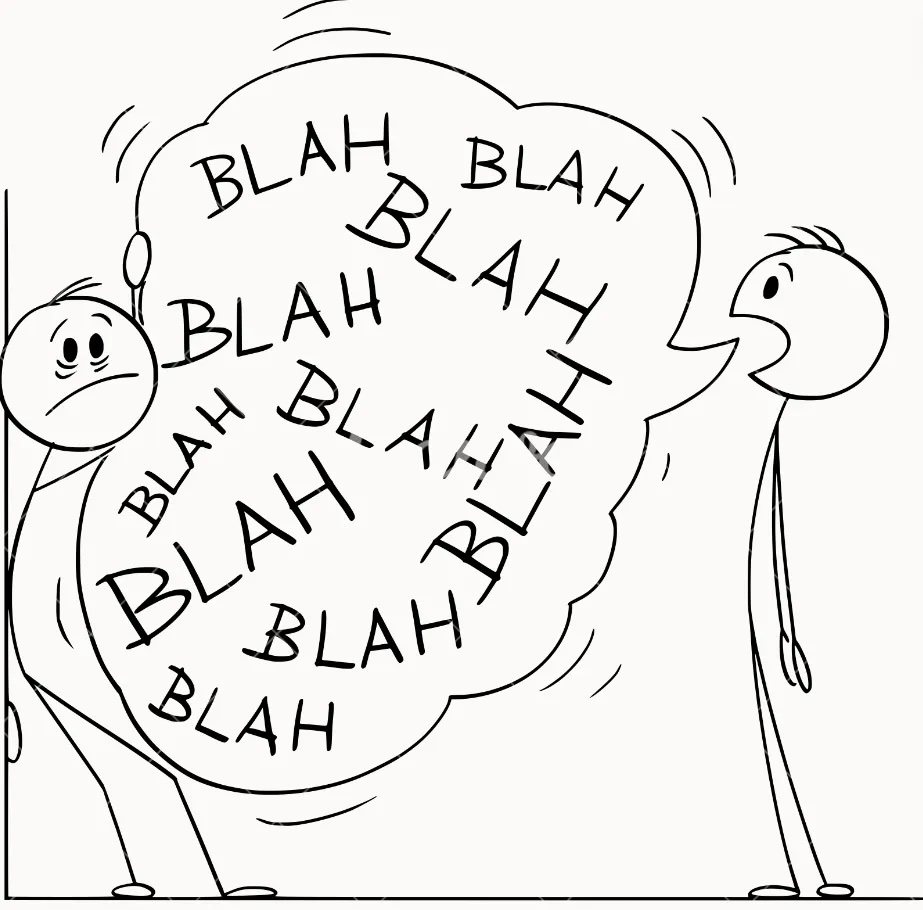
24 Apr Two Ears, One Mouth
Apr 24, 2024
The Meaningful Conversation
Have you ever been in a situation where you speak to someone but feel like they’re just not listening to you?
That’s a rhetorical question, of course. I bet you’ve been in one, and it hasn’t been a pleasant experience. The person on the other side seems to be in their own world, and eventually, as you’re talking to them, you could easily label them with titles like “The King of Not Listening” or “The Never-Stop-Talking Man.”
Such “monologues” are exhausting because you play a very important role to the other person. You’re a solid wall that has one simple function: to reflect sound waves back to them and maintain the impression of having a “meaningful” conversation.
Later, you leave the cafe, the room, or wherever else you are — eager to escape — and one clear thought crosses your mind: “I think I’ve just lost an hour of my life… and there’s no way to get it back.” Meanwhile, you turn around and look at the other person. He seems quite happy. That is the epitome of torture.

What’s on the other side of the coin?
Don’t be shy. We all know that you’ve not just been in a situation like the one above, but you’ve also played the role of the one who cannot stop speaking and just doesn’t listen.
The conclusion
What is the outcome of all this? Well, the one who does not listen will simply reflect their understanding of the world back and forth. They will get stuck in it, with no chance to think outside the box and learn something new—to change the direction of their thoughts and consequently, the actions they could potentially take.
Also, for the one who participates in such an interaction and just listens, this can be exhausting, but on the other hand, they are in a slightly better position because they at least have the chance to learn something new, which probably differs from the way they perceive reality.
More often than not, you will notice that both we and the people around us are not listening. More often than not, we are deeply immersed in our own world and problems and are not open to learning and having real conversations with others.
Reflection
We are not psychologists, and it is not our job to analyse the deep motivations of people. Everyone has their own reasons. In psychoanalysis, there is a well-known term “savage psychoanalysis,” referring to a person who analyses someone without proper training and education. Therefore, we won’t do that, but one thing is clear: such kinds of interactions are not good.
We can only learn and change the direction of our lives by learning something new, which often happens when we are listening and observing.

“We have two ears and one mouth so that we can listen twice as much as we can speak.`` - Epictetus
Epictetus was a Greek philosopher born into slavery. He had a passion for philosophy and was self-taught. He received his freedom after the death of Nero in 68 AD and began to teach philosophy.
With this quote, he is trying to emphasise the importance of listening to everyone. Only through listening can you comprehend what others say and understand their feelings from different perspectives. You should save your speech for when you have something important to say. Only after listening and absorbing as much knowledge as possible should you begin to speak.
Key Takeaways
- Many conversations feel one-sided, leaving the impression that the other party is not truly listening. This can lead to frustration and the sensation of wasted time.
- Those who do not listen miss the opportunity to expand their understanding and remain stuck in their ways, while those who listen may learn new and different perspectives.
- Real learning and personal growth come from genuine engagement in listening and observing.
References
“Nero is one of Rome’s most infamous rulers, notorious for his cruelty, debauchery and eccentricity.” – published by the British Museum
